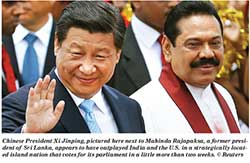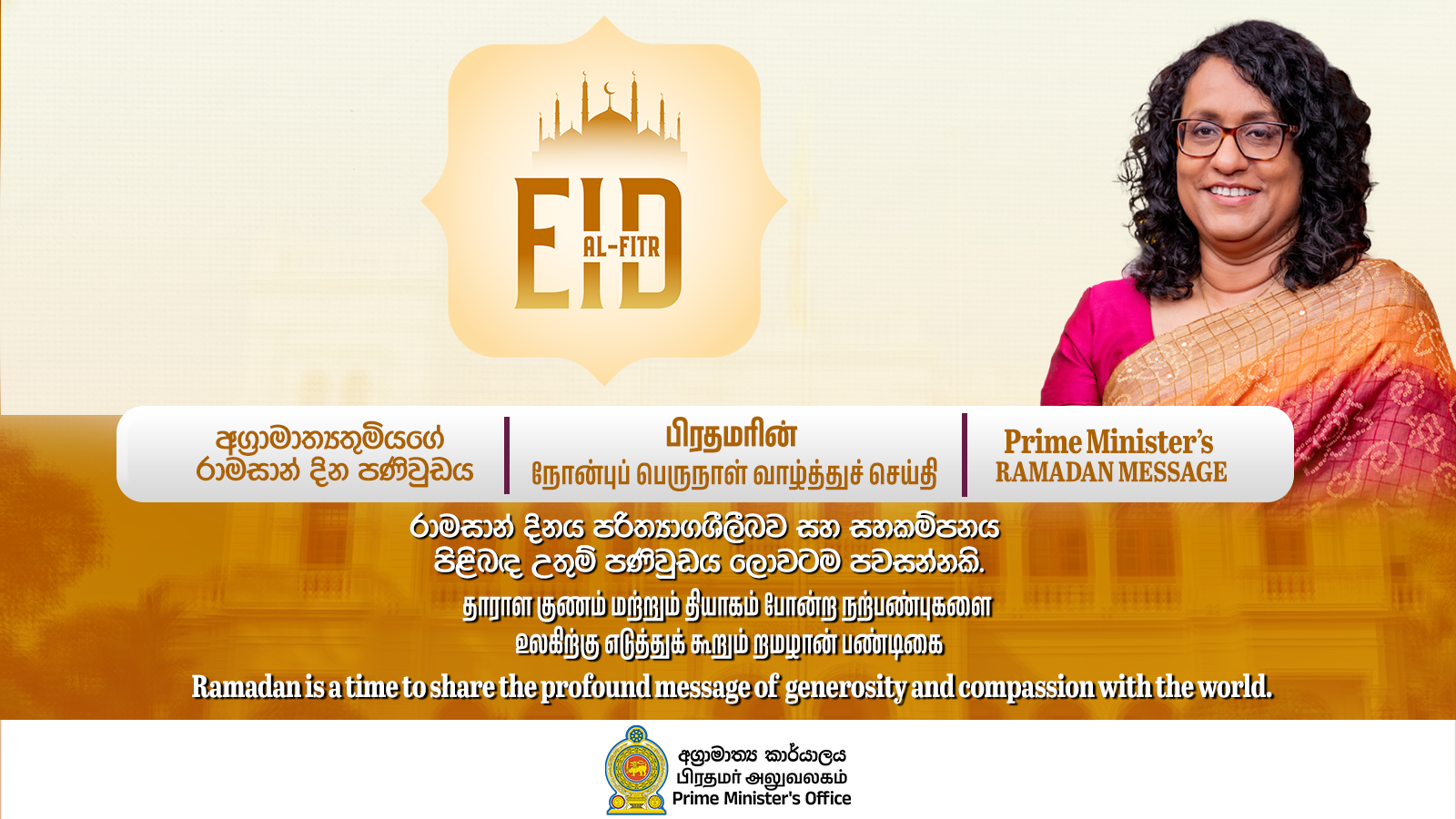News
China poised for diplomatic windfall in Sri Lanka elections

Beijing backs politicians and influential Buddhist leaders, expert says
MARWAAN MACAN-MARKAR, Asia regional correspondent, Nikkei Asian Review
BANGKOK — China is cultivating a wide swathe of political allies in Sri Lanka ahead of the nation’s general elections on Aug. 5, marking a break from throwing its lot in with one dominant political camp.
Foreign policy insiders in the small South Asian nation reckon the strategy fortifies the edge China has over geopolitical adversaries India, Japan and the U.S. when it comes to influencing a country that straddles an increasingly contested stretch of the Indian Ocean.
This diplomatic shift, the insiders say, has been marked by quiet, behind-the-scenes meetings between Chinese emissaries and the leading political parties vying for votes ahead of elections that in a little more than two weeks will determine parliament’s 225 lawmakers.
The coronavirus’s impact in Sri Lanka provided China with an opening to demonstrate its newly tuned diplomacy. Song Tao, minister of the international department of the Chinese Communist Party’s Central Committee, in June hosted a video conference with leaders of Sri Lanka’s major political parties to cultivate bipartisan bonds under the guise of fighting COVID-19.
The island nation has reported 2,674 infections and 11 deaths. According to Luo Chong, a spokesperson of the Chinese embassy in Colombo, the meeting was a goodwill gesture that has been repeated with other allies in the wake of the pandemic. “The International Department of the Communist Party of China conducted several joint-video conferences with different parties in Sri Lanka, Nepal, [the] Philippines, Indonesia and Arab counties, which is a common practice, especially under the current COVID-19 situation,” he told the Nikkei Asian Review.
The pandemic has boosted China’s influence in Sri Lanka, a veteran Sri Lankan diplomat said, referring to a $500 million loan President Gotabaya Rajapaksa desperately sought from China to help fight COVID-19.
“China is the only international player who has the funds to help with such emergencies,” the diplomat said. “Beijing was prompt because it knows which political players it is closer to in Sri Lanka — the Rajapaksas,” referring to the president and his elder brother Prime Minister Mahinda Rajapaksa, a former president.
But seasoned observers of Chinese diplomacy read more into Beijing’s preelection encounters with parties across Sri Lanka’s political spectrum.
Patrick Mendis, a visiting professor of global affairs at the National Chengchi University, based in Taiwan, said the CCP constantly adjusts its diplomacy based on previous outcomes. “It has remarkable agility to change as China learns from its past mistakes in Sri Lanka,” Mendis said. “Now, it supports not only political parties but influential Buddhist leaders, as China realizes the power of the Buddhist clergy in domestic politics.”
In 2015, China was perceived as backing then incumbent President Mahinda Rajapaksa. But Mahinda lost his reelection bid in a shock setback for the country’s most politically influential clan, the Rajapaksas, who had displayed signs of dynastic ambitions.
That 2015 poll, the second after the Rajapaksas presided over the end of a nearly 30-year Civil War, was marked by allegations that India, the regional power in South Asia, and China were bankrolling competing campaigns.
The Rajapaksa camp accused the Research and Analysis Wing, India’s spy agency, of pouring funds into a coalition of anti- Rajapaksa political parties to defeat Mahinda in his run for a third term.
Former President Maithripala Sirisena ended up winning, and his camp accused a Chinese company with investments in Sri Lanka of financing the Rajapaksa campaign.
Last year, in November, Gotabaya Rajapaksa, a former military lieutenant colonel, won a decisive mandate in the presidential poll, signaling voter appetite for a strongman leader after five years of a divisive and dysfunctional administration under an anti-Rajapaksa coalition.
While China burrowed deep into Sri Lankan politics — it has even commissioned local pollsters to gauge voter sentiment — it was also lavishing multibillion-dollar loans on the country for large infrastructure projects ranging from a new harbor and airport to highways. Not surprisingly, China accounts for 10% of Sri Lanka’s ballooning external debt of $55 billion. Compare that number to $88 billion, the size of the island’s economy
The China-funded projects have become a hot-button issue during election cycles as some Sri Lankan voters take a dislike to foreign money paying for strategic assets. “This was never the case before,” a senior South Asian diplomat said. “Foreign policy and foreign investment [used to have] bipartisan backing no matter which party won, but that has changed over the last few years, and strategic investments have become campaign fodder.”
As for Japan, for decades Sri Lanka’s largest bilateral lender and development partner, it now must deal with the Rajapaksa tilt toward China. Mere months into his first term, Gotabaya Rajapaksa has sent mixed messages to Japan about the fate of two multibillion-dollar infrastructure projects, both of which were championed by the previous coalition government.
One is an elevated light railway system through parts of Greater Colombo, the island’s largest commercial city. The new government says the rail will have to be delayed.
The other is an expanded container terminal in Colombo Port, which also has Indian and Sri Lankan backers. The tripartite agreement, signed in 2019 by the previous government, is also at the whim of the Rajapaksa government, which wants new terms. Japan appears unmoved for now. “There is no such fact that Japan and Sri Lanka have agreed to revise the plan of the LRT project,” an official at the Japanese Embassy in Colombo told Nikkei, referring to the Light Railway Transit project. “We understand that this project has so far been implemented as planned by the Sri Lankan implementing agency.”
But India’s government is fuming over the matter, especially now that the Rajapaksa camp is turning the Colombo Port container terminal project into an anti-India campaign issue.
Diplomatic sources in Colombo say India eyed a stake in the Colombo Port as a counterweight to China’s growing dominance in Sri Lanka’s maritime economy.
“The Indians don’t trust the Rajapaksas,” said a diplomat from a Western embassy in Sri Lanka’s former capital. “They see them as doubled-tongued. A reversal on the port project would see India returning to the pre-2015 days of distrusting Colombo.”
The U.S. faces a similar quandary. A $480 million grant under Washington’s so-called Millennium Challenge Corporation was partially meant to help upgrade Sri Lanka’s transport and logistics infrastructure, but it too has become an electoral football, as it was during the presidential election in November. Rajapaksa has profited from the anti-MCC campaign rhetoric of his ultranationalist constituency among the country’s Sinhala-Buddhist ethnic majority.
The U.S. may have to bite this political bullet to achieve its longer-termstrategic vision in the Indian Ocean, which includes Sri Lanka.
“Washington’s attention to Sri Lanka appears to be increasingly fueled by geostrategic concerns about China,” said Nilanthi Samaranayake, director for strategy and policy analysis at the Center for Naval Analysis, a Washington-based think tank. “[There is more] attention on Sri Lanka than ever before… [and there willbe] questions [after the elections] about which direction Sri Lankawill move in regarding its policies toward India, the U.S. and China.”
Latest News
Laugfs LPG to cost more

Laugfs Gas PLC, has increased its price of domestic Liquefied Petroleum Gas (LPG).
Accordingly,
The price of a 12.5 kg cylinder has been increased by Rs. 420 to Rs. 4,100
The price of a 5kg cylinder of Laugfs LPG has been increased by Rs.168 to Rs.1,645.
Latest News
Petrol prices reduced by Rs. 10 from midnight today [31]

The Ceylon Petroleum Corporation (CPC) has announced a reduction in the prices of petrol by Rupees Ten, with effect from midnight tonight (31st March 2025).
Accordingly, the new fuel prices are as follows:
Petrol Octane 92 – Rs. 299
Petrol Octane 95 – Rs. 361
Auto Diesel – Rs. 286
Kerosene – Rs. 183
Super diesel – Rs. 331
News
Ramadan is a time to share the profound message of generosity, and compassion with the World – PM

Prime Minister Dr Harini Amarsuriya in her Ramadan message says that Ramadan is a time to share the profound message of generosity, and compassion with the World.
The full text of the Prime Ministers Ramadan Message:
“As our Islamic brothers and sisters in Sri Lanka and around the world celebrate the sacred month of Ramadan, I extend my heartfelt greetings and best wishes for peace, prosperity, and spiritual fulfillment.
Ramadan is a time of deep reflection, prayer, and self-discipline. It is a period that teaches us the values of compassion, generosity, and unity. Fasting during this holy month is not only an act of devotion but also a reminder of the struggles faced by those less fortunate. It is a time to cultivate patience, humility, and gratitude while strengthening our bonds with family, friends, and the community.
At its core, Ramadan embodies the spirit of kindness, forgiveness, and charity. The practice of Zakat and Sadaqah during this time highlights the importance of sharing with those in need and reinforcing the principle that true prosperity lies in giving and uplifting others. These values are universal and resonate deeply with all communities, fostering harmony and understanding among people of different faiths and backgrounds.
Sri Lanka is a nation rich in diversity, and it is through mutual respect and solidarity that we continue to strengthen our collective future. The spirit of Ramadan reminds us of the need for coexistence, tolerance, and the pursuit of justice and peace.
As the month of fasting culminates in the joyous celebration of Eid, let us carry forward the lessons of Ramadan—compassion, unity, and selflessness—into our daily lives. May this blessed month bring peace to our hearts, our homes, and our nation.
Ramadan Mubarak!”
-

 Sports2 days ago
Sports2 days agoSri Lanka’s eternal search for the elusive all-rounder
-

 Features6 days ago
Features6 days agoCelebrating 25 Years of Excellence: The Silver Jubilee of SLIIT – PART I
-

 Business6 days ago
Business6 days agoCEB calls for proposals to develop two 50MW wind farm facilities in Mullikulam
-

 Business4 days ago
Business4 days agoAIA Higher Education Scholarships Programme celebrating 30-year journey
-

 News3 days ago
News3 days agoGnanasara Thera urged to reveal masterminds behind Easter Sunday terror attacks
-

 Features6 days ago
Features6 days agoNotes from AKD’s Textbook
-

 News2 days ago
News2 days agoComBank crowned Global Finance Best SME Bank in Sri Lanka for 3rd successive year
-

 Features2 days ago
Features2 days agoSanctions by The Unpunished











